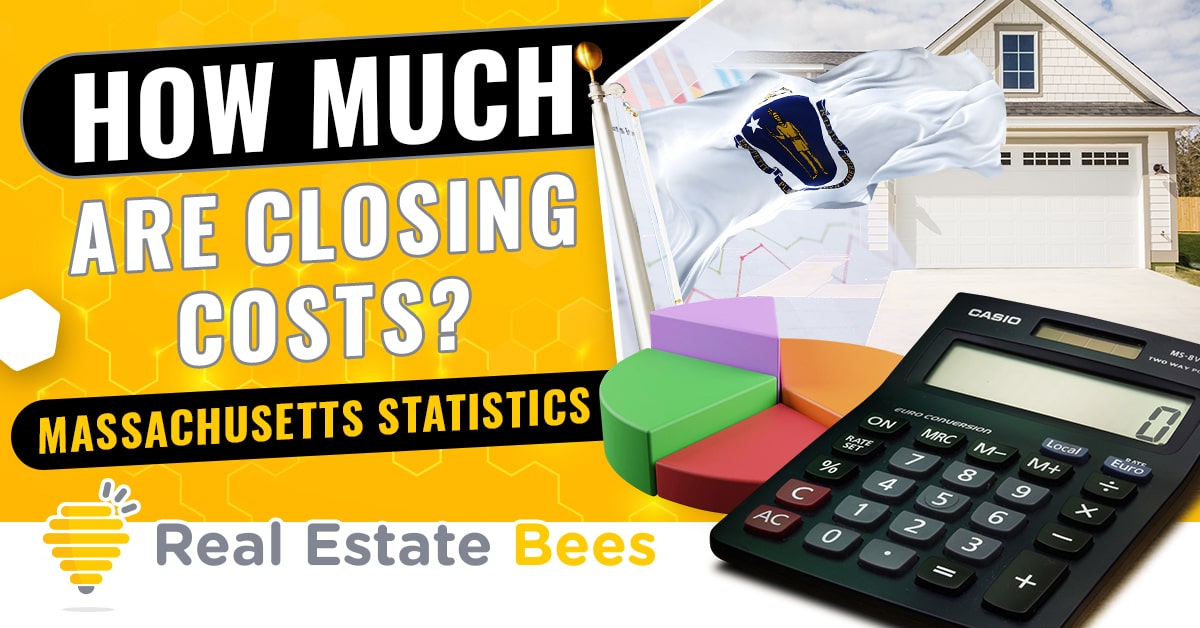Massachusetts Real Estate Closing Costs Statistics (2024 Survey)

A new RealEstateBees.com survey of over 1,000 active real estate professionals found average closing costs for sellers and buyers in Massachusetts.
We reached out to over 1,000 active real estate professionals from Massachusetts to collect their insight on the real estate closing costs across the state.
The results are part of the large-scale survey—Nationwide Real Estate Closing Costs Index—conducted by the Real Estate Bees, a leading online real estate platform.
What Is Included in Closing Costs for a Seller in Massachusetts?
Costs included in seller’s closing costs most commonly across Massachusetts.
What Are Average Closing Costs for a Seller in Massachusetts When Selling with a Realtor?
The most common amounts of seller’s closing costs across the state of Massachusetts in an agent-assisted sale.
What Are Average Closing Costs for a Seller in Massachusetts When Selling 'by Owner'?
The most common amounts of seller’s closing costs across the state of Massachusetts in a FSBO sale.
How to Reduce Closing Costs for a Seller in Massachusetts?

Everything is negotiable. Sellers can negotiate with the agent on their commission and also with the buyers to see if any closing costs can be wrapped into the sale.
Talk to your agent and Massachusetts real estate attorney about your individual situation and what negotiation levers you can pull to reduce your closing costs.

Sellers can find a good realtor who has a reduced commission, like Redfin or other local realtors who may charge only 3-4% commission instead of 5-6%.

Seller costs are pretty fixed in Massachusetts. Sellers pay the broker commission, transfer tax, and maybe small recording fees in the couple of hundred-dollar range.
Can a Seller Avoid Paying Closing Costs in Massachusetts?

There are always some closing costs. A seller can choose not to use an attorney to oversee the transaction for them if they are comfortable and experienced in selling property.
But Massachusetts has a transfer tax which will always be deducted from the sale proceeds at closing.

When the financial crisis happened years ago, we had many closings wherein the seller would have to “bring money” to the closing to pay costs that were above and beyond the sale price.
In Greater Boston, we have not seen that in this marketplace. On a few rare occasions, we had sellers that had to borrow from family or friends, but that is very rare.

Typically, a seller’s share of closing costs would be deducted from the sale proceeds, so a seller does not need to bring any money to the closing.

The easiest thing to do in this situation would be to negotiate down the price of the sale so that the percentage they are paying is less.
What Is Included in Closing Costs for a Buyer in Massachusetts?
Costs included in buyer’s closing costs most commonly across the state of Massachusetts.
What Are Average Closing Costs for a Buyer in Massachusetts When Buying with a Realtor?
The most common amounts of buyer’s closing costs across the state of Massachusetts in an agent-assisted sale.
What Are Average Closing Costs for a Buyer in Massachusetts When Buying Without a Realtor?
The most common amounts of buyer’s closing costs across the state of Massachusetts in a FSBO sale.
What Are Average Closing Costs for a Cash Buyer in Massachusetts When Buying with a Realtor?
The most common amounts of closing costs paid by cash home buyers in Massachusetts in an agent-assisted sale.
What Are Average Closing Costs for a First-Time Buyer in Massachusetts When Buying with a Realtor?
The most common amounts of a first-time home buyer’s closing costs across the state of Massachusetts in an agent-assisted sale.
How to Reduce Closing Costs for a Buyer in Massachusetts?

A buyer can shop around for a real estate lender in Massachusetts who has a streamlined approval process and lower fees in general.
Each lender is very different, so it pays to get a clear picture of the charges prior to committing to a loan.
Some charges are inevitable however, like a lender’s title insurance, Massachusetts property appraisal company fees, and the bank’s legal costs.

Same as with a seller, everything is negotiable in a sale.
It is actually fairly common in MA for the buyer to negotiate with the seller to pay a portion of the closing costs (in specific situations), or to discuss with the lender how to wrap some of the costs into the mortgage.
Talk to your agent and lender about how you, as a buyer, can reduce your closing costs or at least make them easier to pay.

Closing costs are fairly competitive amongst lenders these days. If a buyer can get a lender to waive escrows for property taxes and Massachusetts home insurance, that can be a huge savings “at closing”.
Some buyers negotiate closing cost credits with the seller to cover some of the expenses, but such a credit cannot go beyond the scope of the real costs involved.
How to Negotiate Closing Costs With a Seller in Massachusetts?

Here in Massachusetts, inventory has remained low and prices have continued to remain high.
In many areas within Massachusetts, it’s still very much a seller’s market. Buyers that make offers in these high demand/low inventory areas are still waiving financing contingencies, home inspections, and we are still seeing bidding wars.
In such areas, a buyer won’t see success in getting the seller to cover some of the closing costs.
The longer a property sits with no offers, the stronger the possibility of negotiating a credit from the seller and we are seeing that in some less competitive market areas.

Really lean into the expertise of your agent given your specific market, because it will vary.
Typically, however, negotiating closing costs with a seller happens in situations where a home has been sitting on the market or in renegotiation after a Massachusetts home inspector’s report.
The Massachusetts housing market is quite hot, so negotiating closing costs as part of the initial offer is not always a given.

A buyer certainly can ask a seller for concessions. For instance, the contract could state “Seller to credit buyer x dollars at closing.”
In a strong market as there is currently, it is more difficult, though, to ask for seller concessions since the seller typically has multiple buyers vying for the property.
Can a Buyer Avoid Paying Closing Costs in Massachusetts?

The only way this is possible in Massachusetts would be to ask the seller for these concessions as part of the sale contract.

There are lender programs where the closing costs can be “rolled into the loan,” but that can affect the borrower’s APR and their loan payments overall over time.

As a whole, generally no, but there are a variety of ways they can pay less.
Are There Closing Costs Assistance Programs Available for Buyers in Massachusetts?

There are a number of first-time buyer programs available that can reduce or eliminate buyer’s closing costs.
Also some federal programs like FHA and VA loans may have the option to help buyers with their closing costs.

Yes! Massachusetts has a variety of down payment and first-time homebuyer assistance programs (i.e., through HUD, Mass Housing, etc.) that you should definitely explore when looking for your next home.

There are some first-time buyer programs that some lenders offer that can provide some discounted fees, and most title insurance companies in Massachusetts allow some type of first-time buyer discount.
Who Pays Closing Costs in a Conventional Sale in Massachusetts?
Who Pays Closing Costs in a Cash Sale in Massachusetts?
Are Closing Costs Negotiable in Massachusetts?
What Are the Available Ways to Pay Closing Costs in Massachusetts?
Why Are Closing Costs So High in Massachusetts?

Massachusetts is an attorney state, meaning both sides must bring an attorney to close the sale.
This automatically adds cost to closing, then the other factors depend on if a lender is needed, a Massachusetts real estate agent is used by the seller, etc.
The other reason those costs are so high is that you are paying a percentage of the house purchase price.
Therefore, the more expensive the home, likely the more expensive the closing costs will be.

Typically, lenders will charge the buyer for everything associated with closing a loan.
This includes all their origination fees (points, appraisals, title insurance for lender, title insurance for buyer, a full year of prepaid property taxes, a full year of prepaid property insurance and more!).

The term “closing costs” can be a bit confusing: that category includes items like prepaid interest, fees paid to the Massachusetts escrow company, property tax payments etc.
Typically, escrows, property tax payments, and prepaid interest are a large portion of those “costs”, in addition to the more familiar costs like appraisal, credit report, etc.
Who Pays Closing Costs in a Divorce in Massachusetts?

Typically, if spouses decide or are ordered to sell a home during a divorce, the closing costs would be paid out of the gross proceeds from the sale before the net proceeds are split between the spouses.
In effect, this means that each spouse pays ½ of the closing costs.
The same methodology is usually applied for any remaining mortgage balance, equity loans or liens on the house, as well as any agreed upon improvements that are part of the sale (such as a radon mitigation system) and sometimes any improvements that are necessary to sell the house.
On the other hand, if one spouse is keeping the house and refinancing to buy the other spouse out, the spouse who is buying out the other party would be responsible for paying any costs associated with their new loan.

Divorcing couples selling real estate are ultimately dividing the net proceeds after payment of closing costs or payoff of an existing mortgage.
For a couple who is dividing the house 50/50 or their other assets equally overall, closing costs simply come off the top and so are equally shared in that typical scenario.
However, like most things in a divorce, everything is negotiable.
A couple could negotiate an agreement where one party bears the closing costs, meaning the other party would be credited for that in dividing the net proceeds.

In Massachusetts, whoever is keeping the real estate will pay the costs if, as, and when the house is sold.
If the house is sold pursuant to the divorce, then the proceeds are typically split net of closing costs, Massachusetts real estate brokerage fees, etc.
The costs are paid and then the proceeds split pursuant to the parties’ agreement or the court orders.

In Massachusetts, real estate is not necessarily split equally.
The date of when the property was bought, as well as whether it was used as marital income or the marital residence, is taken into consideration.
It can be negotiated as part of the divorce settlement.

If the sale happens during the divorce or if the judge orders a sale, the parties typically split closing costs.
If one party keeps the home, then they are typically responsible for closing costs. There is no hard and fast rule in Massachusetts on who has to pay for closing costs.

If the property is being sold to a third party, the closing costs associated with the seller would be borne by the seller(s) unless the separation agreement states that they would come out of one of the seller’s shares, but that would generally be outside of the closing.
What Are the Transfer Taxes in Closing Costs in Massachusetts?

In Massachusetts, transfer taxes, also known as tax stamps, cost $4.56 per thousand dollars of the purchase price, rounded up to the nearest $500.00, with the exception of Barnstable County on Cape Cod where the cost is $6.48 per thousand dollars of the purchase price, also rounded up to the nearest $500.00.
For example, if the purchase price is $500,300.00, transfer taxes will be calculated on
$500,500.00.Where the purchase price is less than $100.00, typically where a title transfer is occurring for nominal consideration, no transfer tax is paid.

Massachusetts operates a state deed transfer tax; $2.28 per $500 of the property sale price. This is in addition to local municipalities, which usually have additional charges.
Who Pays Transfer Taxes in Closing Costs in Massachusetts?

The state of Massachusetts has a flexible responsibility system, which can be negotiated between buyers and sellers.
It is common to split the costs for the sake of simplicity, but this is certainly not guaranteed—be sure to consult with a real estate professional.

The seller is responsible to pay the transfer taxes to the Commonwealth upon the title transfer.
However, a buyer can offer to pay the transfer taxes to make their offer more appealing to a seller.
